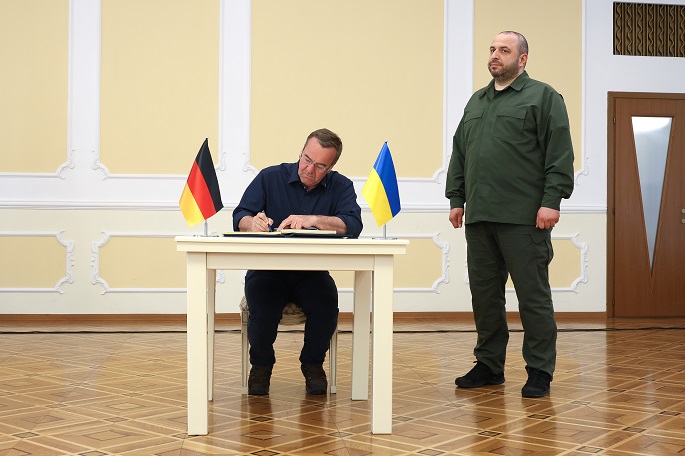Germany allows arms sent to Ukraine to be used on targets in Russia
Published : 31 May 2024, 21:39
The German government authorized Ukraine on Friday to use German-supplied weapons against military targets in Russia.
Ukraine has pressed supporters in recent weeks for permission to use weapons supplied by the West to strike Russian forces on Russian territory.
Several other countries, including the United States, have recently made similar moves to give Ukraine more leeway in its use of Western-supplied weapons, after previously specifying that they should only be used against targets within Ukraine itself.
Those conditions were intended to avoid escalation with Russia and prevent Ukraine's allies from being drawn directly into the conflict. But after over two years of war and renewed Russian aggression, the situation has changed.
German Vice Chancellor Robert Habeck told dpa: "Ukraine does not have enough defensive weapons to protect the lives of its people. It is only logical that Ukraine should defend itself by being able to prevent attacks from Russia. Prohibiting it from doing so would mean the death of more people."
In theory, several weapons systems supplied by Germany could be used to counter Russian attacks from the border region, including the Panzerhaubitze 2000 self-propelled howitzer and Mars II rocket launchers.
German government spokesman Steffen Hebestreit said: "In recent weeks, Russia has prepared, coordinated and carried out attacks from positions in the Kharkiv area in particular from the immediately neighbouring Russian border region."
Hebestreit said there is consensus that Ukraine has the right under international law to defend itself against these attacks.
"It can also use the weapons supplied for this purpose in accordance with its international legal obligations, including those supplied by us," he added.
According to military officials, one of the previous conditions for military aid was that Ukraine was not allowed to shoot down Russian fighter jets in Russian airspace with Patriot missile systems.
It remained unclear to what extent those restrictions remain.
Ukraine had contended recently that Russian forces are exploiting those limitations to mass troops near the border and stage attacks against Ukrainian territory.
On Thursday, the US confirmed that it had authorized Ukraine to use American weapons in limited situations against targets on Russian territory. The weapons are to be used to defend against attacks on Kharkiv and to hit Russian forces that are preparing attacks.
The shift by Western allies came after the United States, France, the United Kingdom and Germany held intensive high-level discussions earlier this week on the use of Western weapons.
French President Emmanuel Macron had already publicly spoken out in favour of a change of course at a meeting with centre-left German counterpart Olaf Scholz on Monday.
Sources in government circles in Berlin described tensions within the German government leading up to the announcement on Friday.
The sources said that Scholz in particular had previously insisted that restrictions should not be eased prematurely, while Defence Minister Boris Pistorius and Foreign Minister Annalena Baerbock had signalled their openness to lifting restrictions some time ago.
Scholz has repeatedly expressed serious concerns about escalating the conflict with Russia and drawing Germany into the war.
He pointed to those concerns when refusing to send long-range Taurus cruise missiles to Ukraine despite repeated requests, and has also publicly ruled out deploying German troops to Ukraine.
Pistorius said Germany would not reconsider its decision against sending Taurus missiles in light of Friday's announcement.
Scholz has described Germany's stance on supplying weapons to Ukraine as a "course of prudence," despite facing allegations from abroad and the centre-right Christian Democrats that he is being too cautious.
He has also faced criticism from others in Germany, particularly on the political left and far-right, for his strong support of Ukraine. Left-wing populist politician Sahra Wagenknecht on Friday accused Scholz of bringing Germany "frighteningly close to World War III."
NATO Secretary General Jens Stoltenberg, however, has put pressure on Scholz in recent days and welcomed the news from Berlin on Friday.
Stoltenberg once again made it clear that he did not fear any irresponsible risks of escalation or retaliatory strikes by Russia against NATO countries.
He told journalists in Prague on Friday that Russian President Vladimir Putin has repeatedly threatened consequences since the beginning of the invasion if other countries supported Ukraine.
But Stoltenberg said only Russia is escalating the conflict, most recently by opening a new front against Ukraine around Kharkiv.


